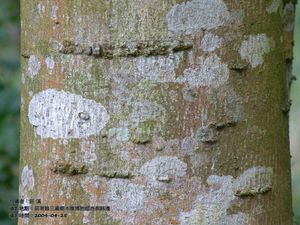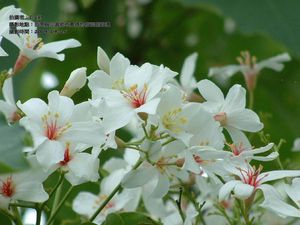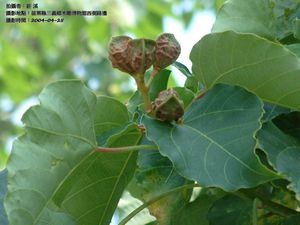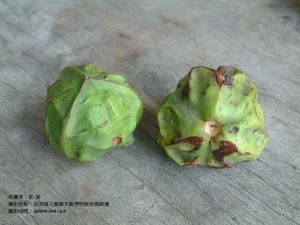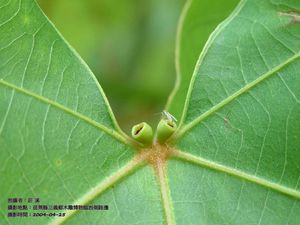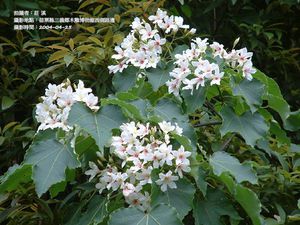油桐
出自台灣有毒中草藥毒性資料庫
| 第1行: | 第1行: | ||
__NOTOC__ | __NOTOC__ | ||
{| | {| | ||
| - | ||[http://tcm-toxic.kmu.edu.tw/index.php/%E5% | + | ||[http://tcm-toxic.kmu.edu.tw/index.php/%E5%AD%B8%E5%90%8D 中英文學名] |
||[http://tcm-toxic.kmu.edu.tw/index.php/%E5%A4%A7%E6%88%9F%E7%A7%91 科別] | ||[http://tcm-toxic.kmu.edu.tw/index.php/%E5%A4%A7%E6%88%9F%E7%A7%91 科別] | ||
| 第178行: | 第178行: | ||
{| | {| | ||
| - | ||[http://tcm-toxic.kmu.edu.tw/index.php/%E5% | + | ||[http://tcm-toxic.kmu.edu.tw/index.php/%E5%AD%B8%E5%90%8D 中英文學名] |
||[http://tcm-toxic.kmu.edu.tw/index.php/%E5%A4%A7%E6%88%9F%E7%A7%91 科別] | ||[http://tcm-toxic.kmu.edu.tw/index.php/%E5%A4%A7%E6%88%9F%E7%A7%91 科別] | ||
在2012年7月3日 (二) 07:22的最新修訂版本
| 中英文學名 | 科別 | 毒性 | 症狀 |
基本資料
|
科別 | 大戟科 Euphorbiaceae |
|
屬名 | 油桐屬 Vernicia |
|
中文學名 | 油桐 |
|
拉丁學名 | Aleurites fordii Hemsl |
|
英文名稱 | Tung tree, Tung Nut, Tung oil tree, Chinawood oil tree |
|
中文俗名 | 三年桐、罌子桐、桐子樹、桐油樹、光桐、五月雪 |
[1-3]
植物圖片
|
油桐樹皮 |
油桐花 |
油桐果實1 | |
|
油桐果實2 |
油桐葉腺 |
油桐 |
油桐簡介
油桐樹源自於中國,其種子油被稱為桐油,在油漆工業中常被作為主要初級的產品之一。然而桐油目前在工業上被使用的非常廣泛,像是製造塗料、油布、樹脂以及人造皮革,也被常用於食品、飲料、藥品等等。其根、葉、花、果實、種子以及種子油常被作為傳統的醫療使用目的,但其植株本身是具有潛在的毒性。根據中國傳統藥物典籍描述,油桐樹主要毒性部分為種子。
外觀簡述
|
莖 | 株高可達20公尺,徑25~45公尺;樹幹通直,樹皮灰白或褐色,平滑;枝條多數,對生或近似輪生,伸長狀,光滑無毛 |
|
葉 | 葉有長柄,互生,心形或闊卵形,長10~25公分,寬 8~15 公分,先端銳尖或漸尖,基部截行至淺心形,紙質,全緣或呈 2~5淺裂,掌狀5~7出脈,初背面具有毛茸,後則光滑無毛;葉柄伸長,長10~20公分,葉基部之二腺體扁圓且無柄,不似千年桐有二杯狀而具柄之腺體。 |
|
花 | 花多先葉而開放,多數,雌雄同株異花,總狀花序頂生,花序長 8~10公分,具有分枝,光滑無毛;花萼略小,鐘形,先端4~5裂;花冠白色,倒卵形,五瓣,中心紅黃色,長2~3公分,寬 2~2.5公分,先端鈍,光滑無毛;雄蕊8~10枚,排成二列,外列附著於花瓣,內列之花絲合生;子房3~5室,每室胚珠一枚;盛開時猶如白雪覆於其上,甚為美麗。初春至夏季4~7月開花。 |
|
果實 | 核果圓形,徑約4~8公分,上下凸尖,形似陀螺,表面光滑;種子3~4枚,闊卵形,長2~2.5公分,像似無腳的褐色金龜子,背上有花紋。種子可榨油,稱為桐油。 |
產地
中國大陸,栽培於江南各省以至貴州。在台灣的南投,高雄和屏東等縣山地保留地,以及台中東勢,嘉義交力坪一帶為多。
使用情況
油桐在台灣主要用於工業用途較多,種子可榨油,作為油漆用油。另外,每年四五月為油桐開花季節,桃竹苗地區油桐花觀光非常盛行。
活性成份
|
莖[5] |
|
|
葉[1, 6-8] |
|
|
果實[9-11] |
|
活性研究
- 油桐在過去常被作為草藥,治療喉嚨痛、呼吸系統疾病以及便祕。有研究發現油桐具有抗病毒的功效,在細胞實驗發現油桐中的12-O-hexadecanoyl-phorbol-13-acetate以及12-O-hexadecanoyl-16-hydroxyphorbol-13-acetate會誘導干擾素之反應,被認為具有調控免疫反應之作用。桐油的脂肪酸(α-eleostearic acid)被發現在25 μM之濃度下對於DLD-1、HepG2、A549、MCF-7以及MKN-7等細胞具有細胞毒性[1-4]。
毒性研究
- 症狀
- 根據臨床案例報導指出,誤食油桐種子產生的症狀包括嘔吐、腹痛、疲勞、嗜睡、腹瀉、頭痛、咽痛、口乾、噁心、震顫、胸悶、出汗以及視力模糊等等,而消化道症狀是急性中毒最明顯之症[3]。
- 有毒成分
- 1. 12-O-hexadecanoyl-16-hydroxyphorbol-13-acetate[12]
- 2. α-eleostearic acid(4)
- 中毒劑量
- 未知
- 機轉
- 未知
- 毒性
- 根據研究指出桐油中的12-O-hexadecanoyl-16-hydroxyphorbol-13-acetate會增加Epstein-Barr virus (EBV)的活性,然而EBV病毒可能會增加惡性腫瘤之發病率[12,13]。
毒性分級
參考文獻
1. Pei YH, Kim JW, Kang HB, Lee HK, Kim CS, Song HH, et al. Tigliane diterpene esters with IFN gamma-inducing activity from the leaves of Aleurites fordii. Bioorganic & medicinal chemistry letters. [Research Support, Non-U.S. Gov't]. 2012 Mar 15;22(6):2318-20.
2. Nakayama FS, Osbrink WL. Evaluation of kukui oil (Aleurites moluccana) for controlling termites. Ind Crop Prod. 2010 Mar;31(2):312-5.
3. Lin TJ, Hsu CI, Lee KH, Shiu LL, Deng JF. Two outbreaks of acute Tung Nut (Aleurites fordii) poisoning. Journal of toxicology Clinical toxicology. 1996;34(1):87-92.
4. Igarashi M, Miyazawa T. Newly recognized cytotoxic effect of conjugated trienoic fatty acids on cultured human tumor cells. Cancer letters. 2000 Feb 1;148(2):173-9.
5. Fozdar BI, Khan SA, Shamsuddin T, Shamsuddin KM, Kintzinger JP. Aleuritin, a Coumarinolignoid, and a Coumarin from Aleurites-Fordii. Phytochemistry. 1989;28(9):2459-61.
6. Ito Y, Yanase S, Tokuda H, Kishishita M, Ohigashi H, Hirota M, et al. Epstein-Barr virus activation by tung oil, extracts of Aleurites fordii and its diterpene ester 12-O-hexadecanoyl-16-hydroxyphorbol-13-acetate. Cancer letters. 1983 Feb;18(1):87-95.
7. Holmes RL, Pack FC, Minor JC, Mckinney RS. The characteristics of domestic tung oils. J Am Oil Chem Soc. 1954;31:417-8.
8. Lee YC, Nobles WL. A chemical study of American tung oil. J Am Pharm Assoc Am Pharm Assoc (Baltim). 1959 Mar;48(3):162-5.
9. Okuda T, Yoshida T, Toh N. Esterified sterol glucoside and methylellagic acids from Aleurites fordii fruits. Phytochemistry. 1975;14(11):2513-4.
10. Okuda T, Yoshida T, Shiota N, Nobuhara J. L-3-carboxy-1,2,3,4-tetrahydro-beta-carboline, a new amino acid from seeds of Aleurites fordii. Phytochemistry. 1975;14(10):2304-5.
11. Okuda T, Yoshida T, Koike S, Toh N. New diterpene esters from Aleurites fordii fruits. Phytochemistry. 1975;14(2):509-15.
12. Ito Y, Yanase S, Tokuda H, Kishishita M, Ohigashi H, Hirota M, et al. Epstein-Barr Virus-Activation by Tung Oil, Extracts of Aleurites-Fordii and Its Diterpene Ester 12-O-Hexadecanoyl-16-Hydroxyphorbol-13-Acetate. Cancer letters. 1983;18(1):87-95.
13. Zeng Y, Miao XC, Jaio B, Li HY, Ni HY, Ito Y. Epstein-Barr virus activation in Raji cells with ether extracts of soil from different areas in China. Cancer letters. 1984 May;23(1):53-9.
| 中英文學名 | 科別 | 毒性 | 症狀 |
